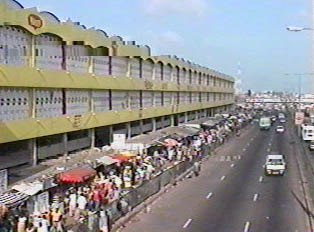LangMedia
Twi in Ghana
Household Goods

Shopping is not a past time in Ghana and does not have a social function as it often does in the west. Ghana is not a consumer society; most people do not have the money to shop as a form of recreation.
There is one large mall in Ghana, which features individually owned shops and merchandise generally aimed at an upper class market. If one is going to buy a dress, one might go to a boutique, which is an individually owned store that is not as expensive as the mall. One can also find used clothing stores that have acceptable used clothing at less cost. One can find both boutiques, second hand clothing stalls, and cloth vendors at the open market.
Traditional women’s garb consists of a long tight skirt and an overblouse. Many Ghanaians have their clothes made by dressmakers who offer a great range of patterns and styles. One can buy fabric at the market or, often, from the dressmaker. Since there are so many dressmakers in Ghana, handmade clothing can often be much less expensive than what is sold at boutiques. For traditional clothing, men go to tailors; however, a greater number of the men buy their clothes ready-made. In some of the cities, one can also have shoes made. Mass-produced Ghanaian shoes tend to be of lesser quality than foreign made shoes.
Various stores located in the shopping district in the larger cities sell clothing, computer and electronic needs, books and other items. Furniture is often bought either from furniture shops or carpenters who sell at the side of the road. One can also have an item of furniture made at a slightly lesser price, either by an individual carpenter or at a shop.
Vendors will circulate through the village selling cooked food as do tradespeople, hawking trades that range from dressmaking, shoemaking, shoe polishing to sharpening knives. Objects for sale include kitchen utensils, pots and pans, and cosmetics. It is common for vendors to sell items on credit. Since there is a great deal of trust in the small village communities, a vendor can afford to sell an item based on a piece of paper indicating the amount owed and the date when it will be paid. Vendors then go on rounds to collect their funds when the time comes.
Videos
-
"Buying Deodorant"Transcript document:
-
"A Newspaper Seller"Transcript document:
-
"Buying Textiles"Transcript document:
-
"At a Stationery Store"Transcript document:
-
"At an Automobile Parts Store"Transcript document:
-
"Types of Liquor"Transcript document:
